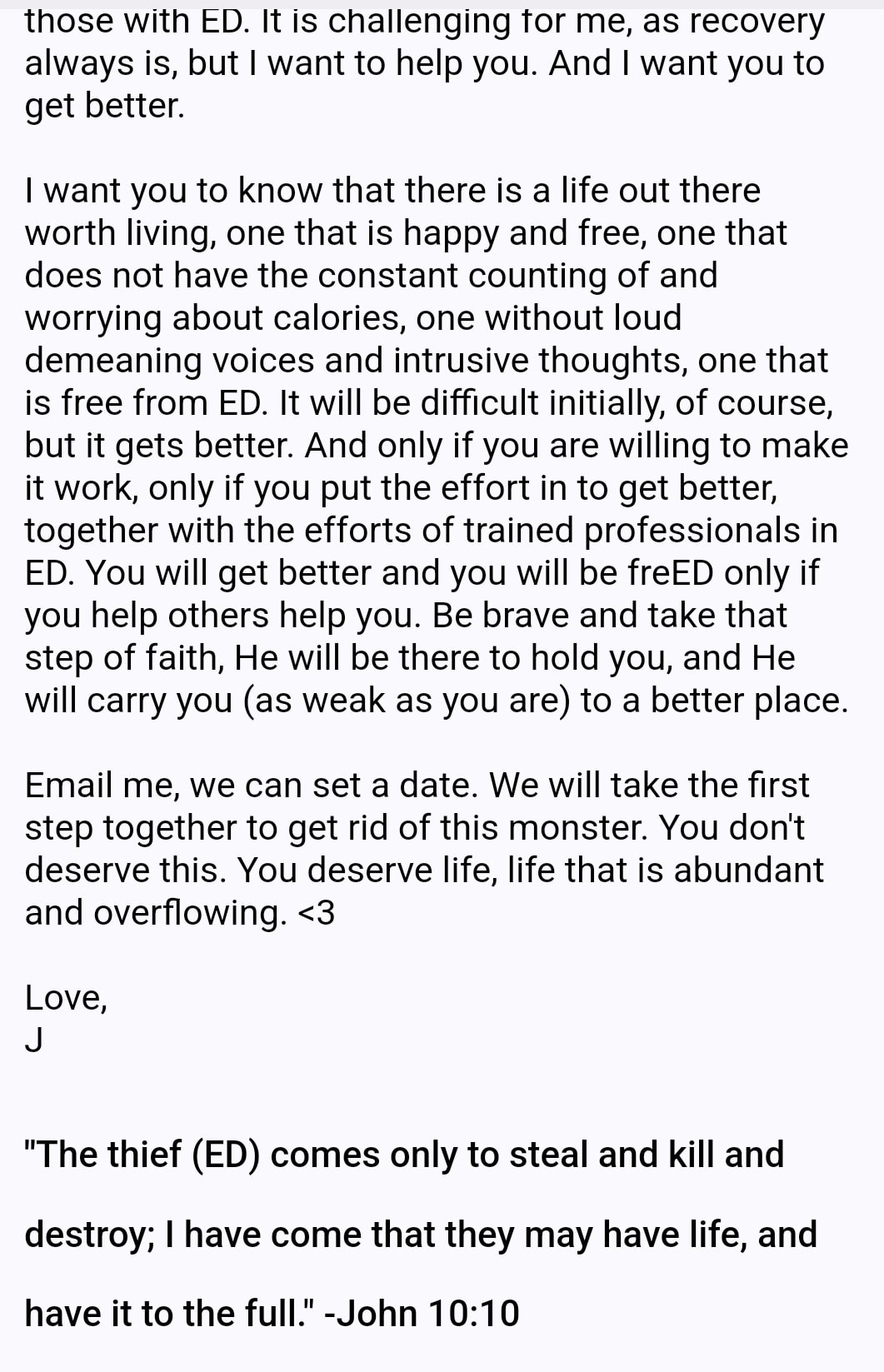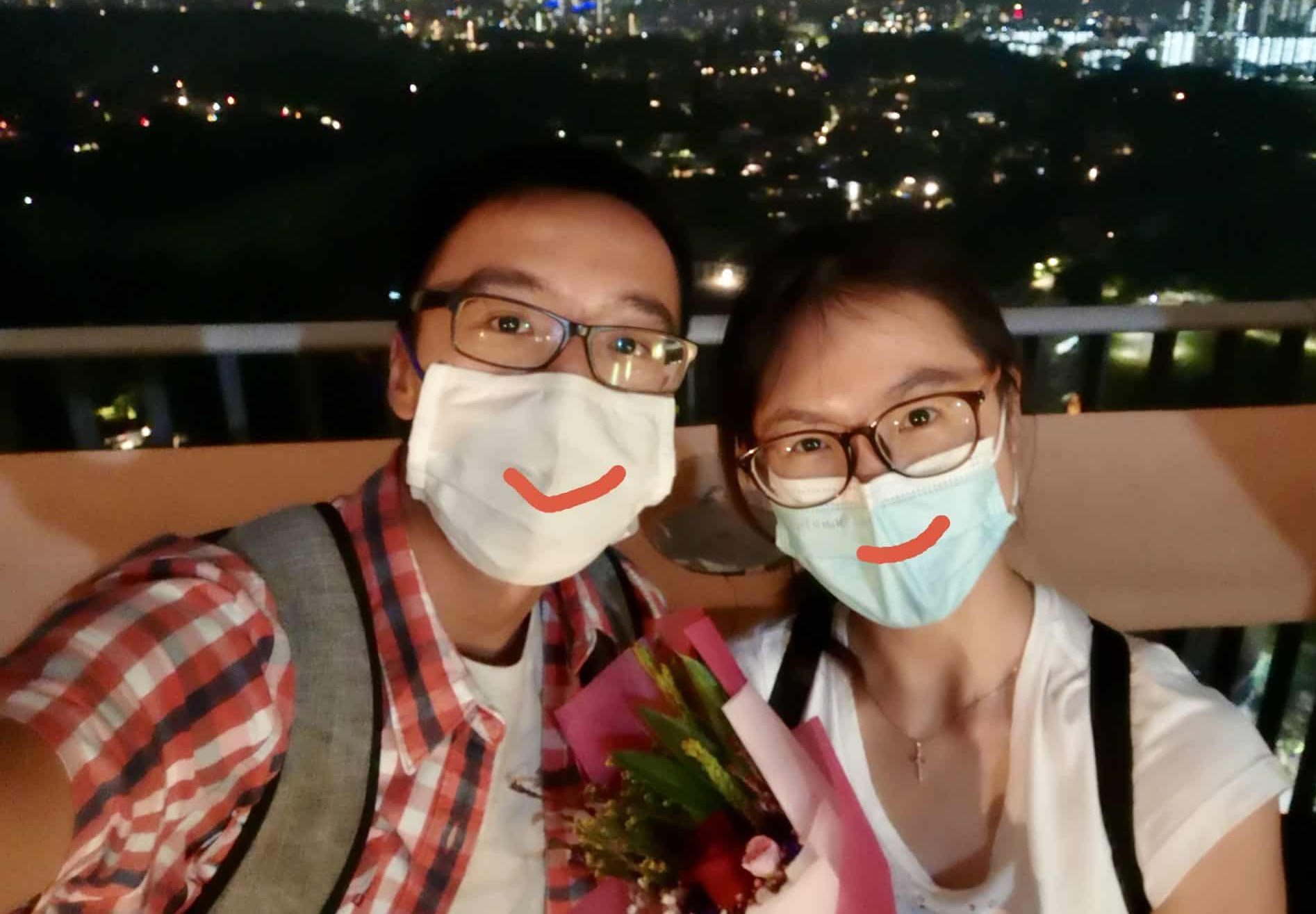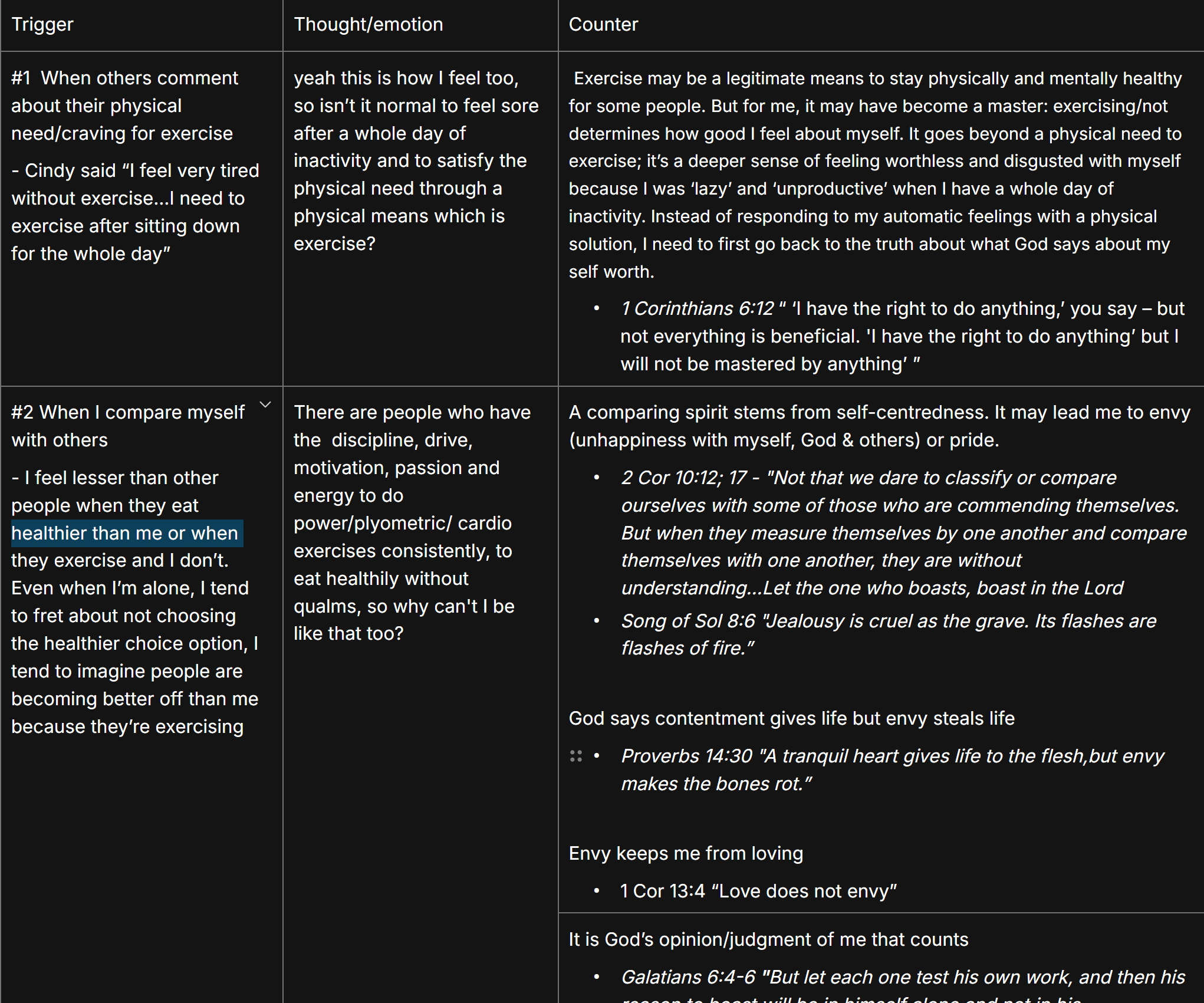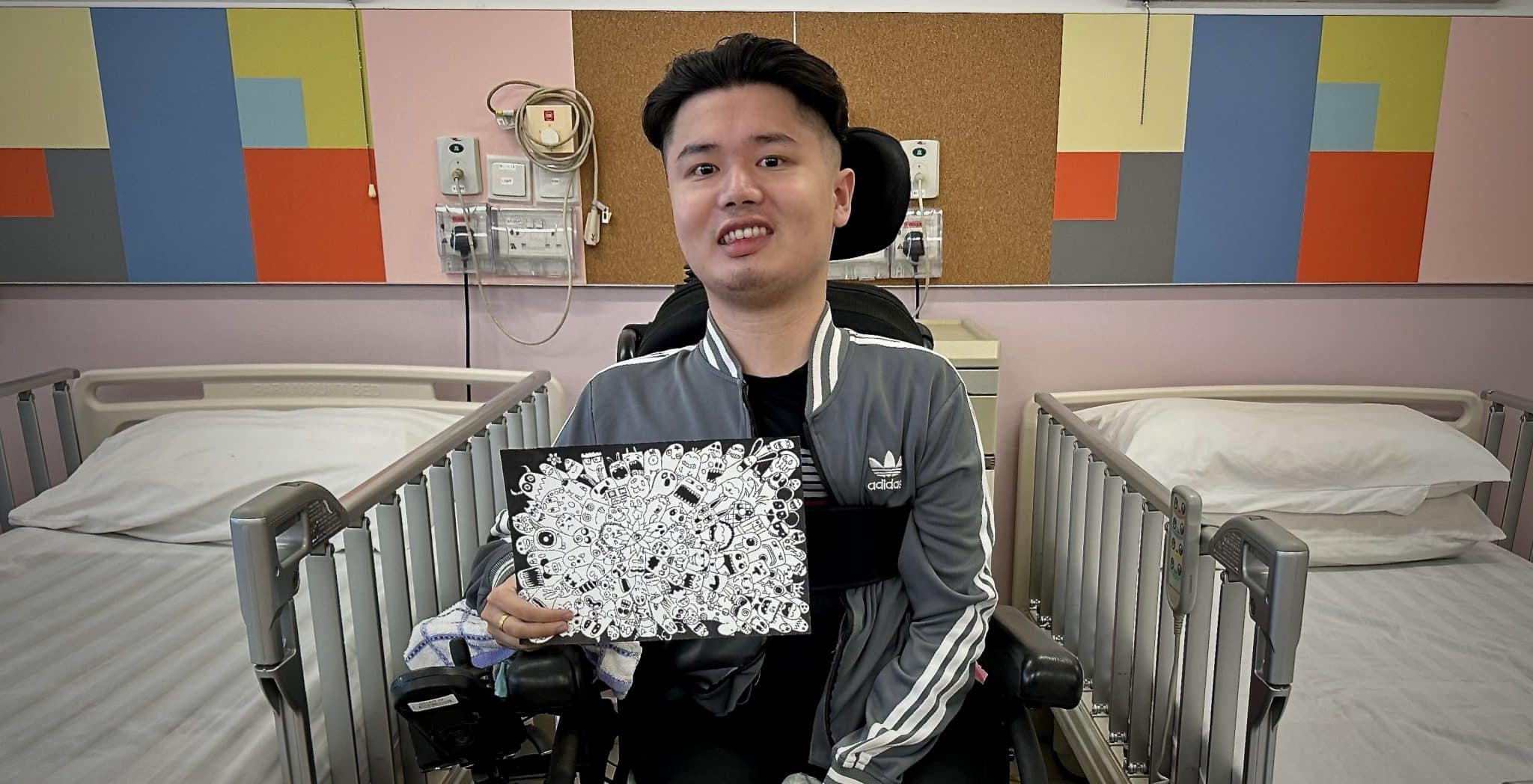“I was rescued from a manipulative, abusive partner. Its name is anorexia”
TRIGGER WARNING: This story mentions an eating disorder. Reader discretion is advised.
Carmen Chia // October 22, 2024, 1:04 pm

“The eating disorder resembled a partner who shamed me into feeling more worthless and hopeless,” writes the author, 27. Photo by Isaac Lim. All photos courtesy of Carmen Chia.
When I was 16, my stomach was frequently bloated.
It could have been due to accumulated stress.
The discomfort drove me to obsessively research causes and remedies online. It led to a hyper-consciousness about calories, nutritional breakdown, and bodily sensations after eating.

Carmen at the start of the slow descent into anorexia.
I began eating less to avoid fullness and to save calories for preferred foods.
I also started swimming and doing home workouts more frequently – initially to improve digestion, but subsequently to control my body shape.
I found comfort in the belief that I could control the bloat. Praying desperately for physical healing had no immediate results. In contrast, eating less and exercising more seemed to reduce the bloating – at least temporarily.
Ironically, my coping methods exacerbated the bloat as the weight and diet changes slowed down my gut movements.
Unclean rules
When I turned 17, the pressure from the transition to JC (junior college) and preparation for the GCE ‘A’ Levels intensified my need for validation. I found this through fulfilling “clean eating” rules and a strict exercise regime.

“I avoided foods with fats and came early to school every other day to run 10 to 15 rounds around the track,” said Carmen of her JC days.
They gave me a momentary sense of accomplishment, pride and satisfaction, especially when people around me praised me for being so fit and disciplined.
However, when I broke any of my rules, I felt overwhelmingly guilty, irritable and distressed to the point that I was barely able to focus on anything else.
I lost interest in most aspects of life including studies, relationships – and my faith.
I lived in constant fear of not being able to meet my own expectations. I lost interest in most aspects of life including studies, relationships – and my faith which I had been passionate about.
I lost weight rapidly.
(I am not including the weight I lost or photos at my lowest because I’ve experienced how it can trigger comparisons and thoughts of not being “sick enough”. It took me a long time to learn to detach my worth from numbers and comparisons and I hope sufferers like myself will find courage and patience to learn this truth too.)
By the time others noticed something was wrong, I had lost so much weight I looked like I was on the brink of death. Concerned, family, teachers and classmates encouraged me to eat more and exercise less, but to no avail.
Embarrassed by stares and comments from people, I withdrew from social settings, especially communal meals.
Conflicts at home intensified as my parents grew increasingly worried and frustrated with my lack of progress.
Reluctantly, I followed my parents to see a general practitioner. He told me point blank that I was suffering from anorexia.
(Anorexia is a type of eating disorder which involves restriction of food, leading to a significant low body weight and an intense fear of gaining weight. This disorder affects between 0.5% to 2% of young people worldwide; in Singapore, 7.4% of females (aged 12 to 26) are at risk of developing an eating disorder.)
My loved ones pleaded with me to regain my appetite and weight “for their sake”. I felt rejected and misunderstood.
Neither I nor my parents could accept the diagnosis.
If I could personify anorexia (or what I thought it was at that time), it resembled a manipulative abusive partner. It preyed on me whenever I was feeling worthless and helpless, offering immediate relief and satisfaction but trapping me with impossible demands of my time, energy and soul. When I failed to meet its demands, it mercilessly shamed me into feeling more worthless and hopeless than before.
In my mind, anorexia was reserved for vain people who consumed diet pills and starved themselves.
I was still eating and was not losing weight to fit into skinny clothes, I thought.
Desperate, my loved ones pleaded with me to regain my appetite and weight “for their sake”.
It made me feel guilty and ashamed of myself. I felt rejected and misunderstood.
Rock bottom
At rock bottom, I experienced gastric pains, constipation and emotional breakdowns so frequently that each day felt impossible to get through.
I finally went for counselling at church that my mentor had recommended, and learnt that underlying my behaviour were deeper issues of shame, worthlessness and an unmet need for control.
I felt a deep dissonance between my new-found insight and my actions … I felt ashamed and guilty before God.
I realised that I had been climbing up a never-ending flight of stairs my whole life; no matter how much I achieved, my goal-post was always shifting; I was never satisfied with myself.
Church leaders helped me see that I had been misusing Bible verses to justify my disordered thought patterns. For instance, I forced myself to suppress any desire for food and rest with the verse “The heart is deceitful above all things and beyond cure …” (Jeremiah 17:9).
With the help of church leaders and the counsellor, I began to re-learn how God sees me. That no amount of “discipline” over my eating and body meant anything to God; it was a behaviour driven by pride and fear, rather than faith and a love for Him and people. Even with this understanding, I struggled to stop over-exercising and under-eating.
Voices of self-condemnation often overwhelmed my rational thoughts. Whenever I tried to get around my rules, I would have thoughts like: “If you stop exercising, you would lose everything you have built and go back to becoming lazy and worthless.”
These thoughts were so oppressive, I often felt like I couldn’t continue doing anything until I redeemed myself by skipping a meal or exercising doubly hard.
I felt a deep dissonance between my newfound insight and my actions. As a result, I avoided reading the Bible, worshipping God or praying as it made me feel ashamed and guilty before God.
Email from a stranger
Then in 2017, a fellow university student (let’s call her Jane) reached out to me via email. She had recognised my symptoms and encouraged me to seek professional help.
Initially embarrassed, I intended to ignore the email.
However, a Bible verse in Jane’s email struck me: “The thief comes only to steal, kill and destroy. But I (Jesus) have come to give you life to the fullest.” (John 10:10).

Screenshot of the 2016 email from Jane. ED is short for eating disorder.
I realised that I had resigned myself to living as a slave to my disorder when God desired me to enjoy my life fully.
When I met up with Jane, she shared her own journey with an eating disorder, and how God had compelled her to reach out to me even though she was initially triggered by my appearance.
I had been shutting God out … And here He was, reaching out to me through a complete stranger.
I could not believe it. I had been shutting God out all this while because I felt too ashamed. And here He was, reaching out to me through a complete stranger.
Jane encouraged me to seek help from the eating disorders unit at Singapore General Hospital (SGH). Here, I received holistic support from a genuinely caring team that included a psychiatrist, psychologist, dietician and physiotherapist. They were patient and affirming.
The psycho-education sessions helped me understand why I needed to stop exercising for a period, replenish my nutrients, and take medication for my mood.
My doctor also helped my caregiver – my mother – recognise the influence the eating disorder had over my behaviour. This, I believe, helped to reduce her anger and blame towards me.

Carmen (right) with a “God-sent friend” – the first person who told her about Jesus. They have been close friends since primary school.
With all this support and the encouragement from those around me, I was back to a healthy weight within a year.
Slow, silent relapses
However, I still held on to certain value judgements toward food, body image and fitness. I had two relapses. They came on slowly and silently.
The first, in 2018, was triggered when I could no longer fit into my smaller-sized clothes, and when I received comments from people regarding my weight gain and appearance.
Dissatisfied with my body, I went for seemingly-harmless trial sessions from a buffet of fitness classes offered through a certain app. It spiralled into an addictive relationship with exercise.
God highlighted to me that instead of being a pleasurable leisure activity, exercise was a source of stress and preoccupation.
My second relapse, in 2022, was triggered by work stress. In my first job as a social worker, I blamed myself when I could not help my clients achieve the progress I desired for them.
It was difficult to admit, even to myself, that I had relapsed. For one, my weight drop was not as glaringly obvious as before, and I wanted to maintain my image as a victorious overcomer of an eating disorder.
When I tried sharing my struggles with others, I received comments like “What a good problem to have!” or “I wish I had your struggle”.
It made me doubt whether my distress was valid. Besides, I secretly enjoyed the admiration I received for my discipline to exercise consistently.
Nonetheless, during my personal devotions, God highlighted to me that instead of being a pleasurable leisure activity, exercise was a source of stress and preoccupation that was eating away at my mental and physical health, and draining my devotion to Him.
During this period, I felt like God did not understand how miserable and difficult change was for me.
Angels and buddies
However, God did not give up on me and found ways to reach me via people He put in my path.
Once, after a gym workout, two strangers came up to pray for me; they had no knowledge of my situation.
Once, after a gym workout, two strangers came up to pray for me; they had no knowledge of my situation.
Another time, after a fitness class, the instructor approached me saying: “I know what you’re going through. It’s difficult, but I’m praying for you. We are fearfully and wonderfully made in His image (Psalms 139:14).”
God also sent patient Christian friends and colleagues who sat through my emotional breakdowns with me, guided me to tease apart my jumbled thoughts and explore what God says about each of these thoughts.
My running buddies changed our runs to nature walks after learning about my struggle. One of them, John, who is two years my senior, became my partner. He is now my fiancé.

“John was initially clueless about eating disorders. I am grateful for how he sat in with me during my medical appointments, read my treatment notes, prayed with me and worked with our mentors and me to manage triggers and distressing thoughts,” said Carmen.
Since 2018, John has seen me through my relapses and recovery.
At my lowest emotionally, God used the song ‘Here Again’ by Elevation Worship to affirm His unwavering commitment to me. As I listened to the song, Romans 8:38-39 came to mind: “For I am convinced that neither death nor life, neither angels nor demons, neither the present nor the future, nor any powers, neither height nor depth, nor anything else in all creation, will be able to separate us from the love of God that is in Christ Jesus our Lord.”

“On nights that I felt distressed and overwhelmed by my thoughts, I went on walks and listened to my arsenal of Christian ‘battle songs’ that let me pour out my feelings to God and be reminded of His truths,” said Carmen.
As I opened my hardened heart to God again, I began to understand that my life belongs to Him – the One who knows my deepest needs and purpose, cares deeply about me and has plans to give me a hope and a future (Jeremiah 29:11).
It was then that I acknowledged that my destructive behaviours were harming me and that giving them up to live fully for God, though painful, would lead to greater joy and purpose.
I trusted that it is only with His help that I can counter the voices of condemnation and stay on the path to recovery.
Fighting back
During the relapses, I returned to hospital for treatment. Once again, I experienced God’s grace and miraculous provisions.
During my first return to the hospital, my usually stern doctor surprised me by assuring me that she did not judge me for the relapse and would support me as long as I was willing to receive help.
We discussed how I could redirect my focus toward more meaningful pursuits such as helping and caring for others.
She also took a leap of faith to refer me to a newly-launched Compulsive Exercise Programme run by a physiotherapist. (Usually, only patients who have hit a minimum weight are allowed into this programme.)
The programme turned out to be exactly what I needed. It provided a useful framework to understand and work through my misconceptions and unhealthy relationship with exercise.
It also helped that I formed a very good rapport with the physiotherapist who was open to share her personal experiences and integrate my spiritual values into the therapy. As we discussed strategies to cope with withdrawal symptoms when I stopped exercising, she reminded me of my faith and how I could turn to God in prayer.
We also discussed how I could redirect my time and focus toward more meaningful pursuits such as personal devotions, rebuilding relationships as well as helping and caring for others.

“During my second relapse, I took a break from work to attend a three-month programme at Tung Ling Bible School, to help me to realign my perspective of myself and life with God’s.” Carmen with her Bible schoolmates.
During my second relapse, I received additional counselling supported by my employer to help me cope with my work stress. Through these sessions, I saw the need to work on my recurring struggle with self-worth that often drives me toward self-punishing ways of coping.
Inspired by 2 Corinthians 10:5 which exhorts us to “take captive every thought to make it obedient to Christ”, I took an active approach in managing the oppressive thoughts, guided by my church mentors, professionals and books.

I tabled a list of common thoughts that were hindering my change. I prayed and sought the Bible for God’s response to each of these thoughts.
Having faith that God’s Word holds far more authority than the voices of self-condemnation helped me to follow through with the treatment plan.
Verses like 2 Corinthians 3:17 and Galatians 5:1 pointed me to the kind of freedom and life that God desires for me, which was exactly what the disorder was robbing from me.
Most importantly, Romans 12:1-2 is a constant reminder that my life was meant to please God and to direct my mind towards His standards rather than my worthless rules.
True love is …
I experienced God’s patience and consistent grace despite my slip-ups and doubts.
Back when I first wrestled with constant bloating, I had questioned where God was and why He did not heal me despite my fervent prayers.
My God is gracious and compassionate. Though he corrects me, He will never diminish my worth.
On hindsight, I see that I was merely asking for a band-aid when He wanted to treat my wounds thoroughly.
During my relapses and backfired attempts to recover, I also questioned if God cared about the torment I endured from the voices in my head.
Now, I understand that God had already equipped me with every weapon to overcome opposition and was teaching me how to use them so I need not fear anything.
Having gone through three recovery journeys, I have learnt to better distinguish between the voice of the disorder and God’s voice.
In contrast to anorexia – that manipulative abusive partner – my God is gracious and compassionate. Though He corrects me, He will never diminish my worth. He is also a generous God; though He may ask me to give up certain habits or desires, He promises to give me far more.
Romans 8:1-2 assures me that God’s voice is definitely unlike the voices of condemnation I was hearing daily.
Finally, this journey has humbled me to realise that I am not immune to falling again. My struggles with self-worth could very well be activated again by different triggers.
I hope that others don’t see me as an overcomer but as a grateful recipient of God’s kindness and grace.
Staying on the path of recovery requires consistent and honest self-reflection before God. I remind myself daily to apply truths from the Bible to my life, and to have faith in His ability to meet my needs for self-esteem and mastery.
I have also become more empathetic, patient and gentle to others in their struggles – just as I have seen how God has been to me.
I first shared part of my story anonymously in the book Our Own Voices to help others understand more about the disorder.
I am now choosing to reveal my identity in this story because I have learnt to own the “ugly” parts of my narrative as well as the growth and lessons that God has taught me through these detours. I hope that others don’t see me as a victorious overcomer but simply as a grateful recipient of God’s kindness and grace.
This story first appeared in Salt&Light’s sister platform, Stories of Hope.
RELATED STORIES:
Burnt out so many times he lost count, now he helps others build mental resilience
We are an independent, non-profit organisation that relies on the generosity of our readers, such as yourself, to continue serving the kingdom. Every dollar donated goes directly back into our editorial coverage.
Would you consider partnering with us in our kingdom work by supporting us financially, either as a one-off donation, or a recurring pledge?
Support Salt&Light



